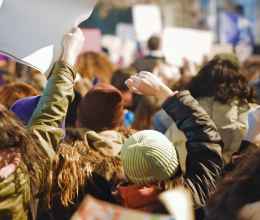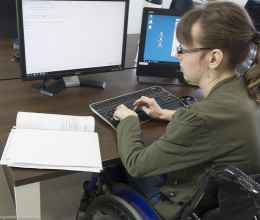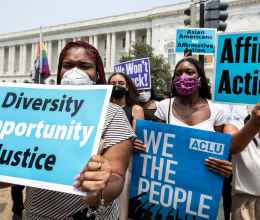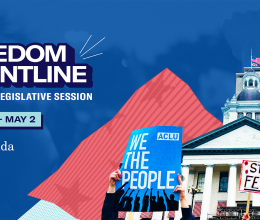
In 2023, the Florida legislature passed an anti-trans bathroom law that—in certain settings—makes it criminal trespass to refuse to leave a restroom or changing facility that does not align with an individual’s sex assigned at birth after being told to do so by a government employee. Fla. Stat. § 553.865.
The law is complex, confusing, and vague. This document discusses some basic questions and considerations regarding the law. The following is not legal advice. For legal advice on your individual situation, please contact an attorney.
Ultimately, using a bathroom in a public place requires decisions that are influenced by an array of circumstances–varying from person to person, location to location, and day to day. This guide provides some information that may help inform those decisions.
Where can I use the bathroom?
Because of Florida’s anti-trans stance, one might think the law applies in all public places. Instead, the law only applies to bathrooms and changing facilities in buildings owned or leased by the state of Florida or a local government entity in Florida.
- Generally, the law applies to bathrooms and changing facilities in:
- State government buildings, including courthouses, legislative offices, public-benefits offices, and other state agency offices
- City or county government buildings, libraries, tax collectors, and HSMV offices
- State prisons or jails, plus immigration detention centers run by local law enforcement
- Bathrooms in state parks and service plazas located on Florida toll roads
- The law purports to apply to all schools in the state at all levels, whether public or private. If you are a student, teacher, or otherwise work at the school, the criminal trespass provision does not apply, but the law requires that schools discipline individuals who refuse to leave restrooms inconsistent with their sex assigned at birth after being told to do so. However, members of the public who visit a school can be subject to the criminal provision.
- Some public buildings like airports and sports arenas are owned by state or local governments and are covered by this law. It may be very difficult to determine whether a particular building such as these are covered by the law, which in turn may impact the likelihood of enforcement of the law in those settings.
- Federal buildings are not covered. That means the ban does not apply to:
- Federal courthouses, office buildings, international embassies, and the like
- Federal public-benefit offices for Social Security and Medicare
- Military bases
- Federal detention centers
- National parks, monuments, and facilities operated by the National Park Service
- Private businesses, organizations, and religious institutions are not covered unless they operate inside a state-owned building.
- The law does not apply to bathrooms in private homes or apartment buildings.
Unless you believe that the bathroom is covered in numbers 1, 2, or 3, or the bathroom sign indicates that it is a public bathroom covered by Fla. Stat. § 553.865, the law probably does not apply and the criminal trespass provision is less likely to be enforced for that bathroom.
How can I protect myself when using a bathroom in public?
- Use the bathroom with purpose: go to the toilet or sink you need, use it as needed, wash and dry your hands, and leave.
- If someone confronts you, claiming that you are in the wrong bathroom, relay that you will be done momentarily or that you will leave as soon as you finish, and avoid further confrontation.
- If someone threatens violence against you, leave as immediately as you can.
- If asked to leave by a police officer or by a government employee associated with that building, leave as immediately as you can.
- The police cannot lawfully arrest you for trespass without a warrant under these circumstances unless you have a weapon on you or unless the officer was also present when a government employee associated with the building asked you to leave and you refused to do so. This means that you should be allowed to leave the bathroom peacefully without being arrested.
Are there exceptions to the law?
Yes, you can use a “unisex” bathroom or changing facility that locks to prevent others from entering. You can bring family members with you into these facilities.
The law also provides five exceptions for specific situations. These exceptions apply to anyone regardless of their gender identity and are identified in Fla. Stat. § 553.865(6). A person can enter any bathroom for these reasons:
- “To accompany a person of the opposite sex for the purpose of assisting or chaperoning a child under the age of 12, an elderly person as defined in s. 825.101, or a person with a disability as defined in s. 760.22 or a developmental disability as defined in s. 393.063.”
- “For law enforcement or governmental regulatory purposes”
- “For the purpose of rendering emergency medical assistance or to intervene in any other emergency situation where the health or safety of another person is at risk”
- “For custodial, maintenance, or inspection purposes, provided that the restroom or changing facility is not in use”
- “If the appropriate designated restroom or changing facility is out of order or under repair and the restroom or changing facility designated for the opposite sex contains no person of the opposite sex”
What should I do after being told to leave a restroom by the police or by a government employee associated with that building?
- When you are somewhere safe, write down what happened and the names or roles of any people who asked you to leave or threatened you.
- Find out what City, County, or State agency is responsible for the bathroom.
- Fill out the questionnaire at https://action.aclu.org/signup/fl-impacted-florida-public-building-restroom-ban-we-want-connect-you







